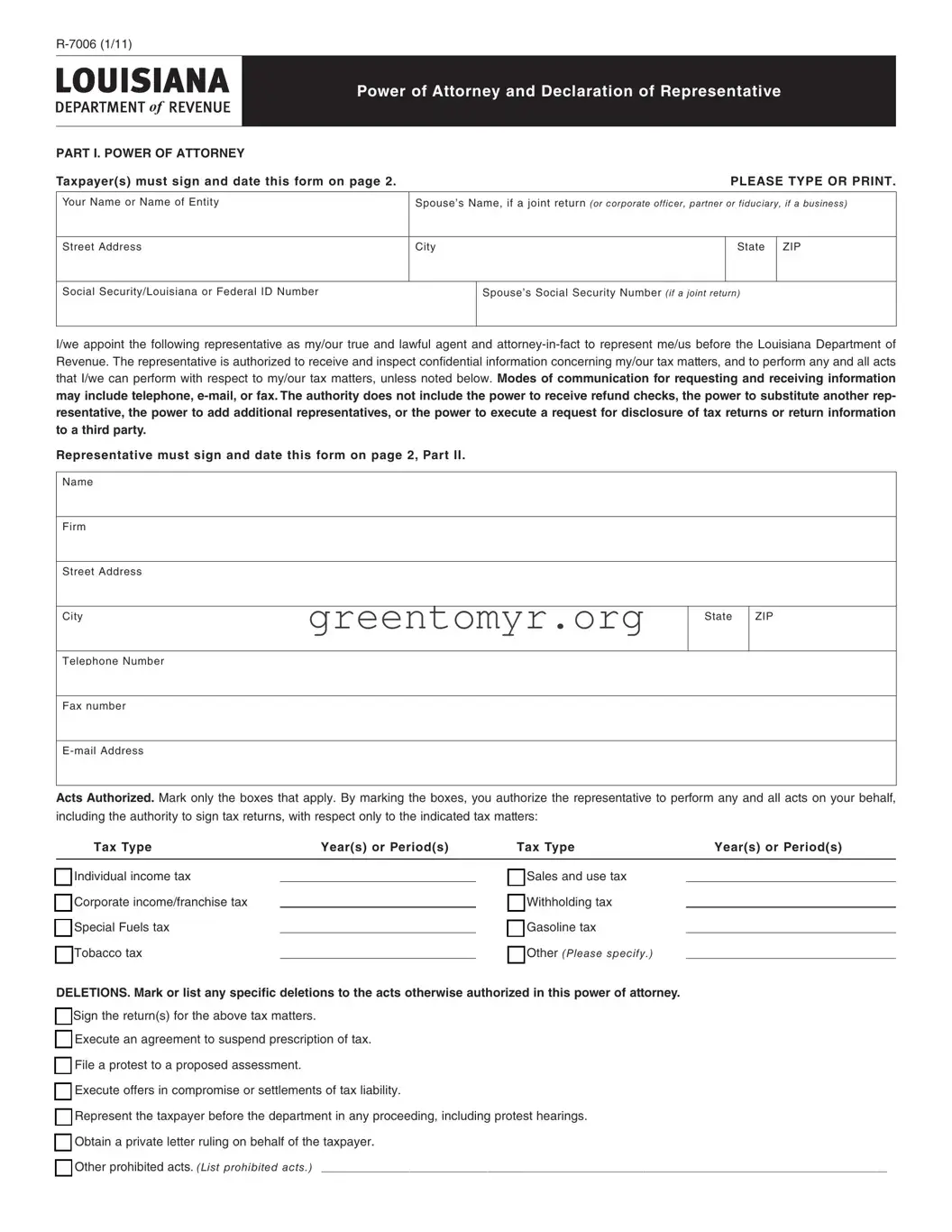NOTICES AND COMMUNICATIONS. Original notices and other written communications will be sent only to you, the taxpayer. Your representative may request and receive information by telephone, e-mail or fax. Upon request, the representative may be provided with a copy of a notice or communication sent to you. If you want the representative to request and receive a copy of notices and communications sent to you, check this box. □■
REVOCATION OF PRIOR POWER(S) OF ATTORNEY. Except for Power(s) of Attorney and Declaration of Representative(s) fled on Form R-7006 (1/11), the fling of this Power of Attorney automatically revokes all earlier Power(s) of Attorney on fle with the Louisiana Department of Revenue for the same tax matters and years or periods covered by this document.
Signature of Taxpayer(s). If a tax matter concerns a joint return, both husband and wife must sign if joint representation is requested. If signed by a corporate officer, partner, guardian, tax matters partner, executor, receiver, administrator, or trustee on behalf of the taxpayer, I certify that I have the authority to execute this form on behalf of the taxpayer.
IF THIS POWER OF ATTORNEY IS NOT SIGNED AND DATED, IT WILL BE RETURNED.
_______________________________________________________________________________________________________________________________________ |
______________________________ |
Taxpayer signature |
|
Date (mm/dd/yyyy) |
____________________________________________________________________________________________________________________________________________ |
_________________________________ |
Spouse signature |
|
Date (mm/dd/yyyy) |
_________________________________________________________________________________ |
_______________________________________________________ |
_________________________________ |
Signature of duly authorized representative, if the taxpayer |
Title |
Date (mm/dd/yyyy) |
is a corporation, partnership, executor or administrator |
|
|
Part II. DECLARATION OF REPRESENTATIVE
Under penalties of perjury, I declare that:
•I am not currently under suspension or disbarment from practice before the Internal Revenue Service.
•I am authorized to represent the taxpayer(s) identified in Part I for the tax matters specified there; and
•I am one of the following: (insert applicable letter in table below)
a.Attorney—a member in good standing of the highest court of the jurisdiction shown below.
b.Certified Public Accountant—duly qualified to practice as a certified public accountant in the jurisdiction shown below.
c.Enrolled Agent—a person enrolled to practice before the Internal Revenue Service.
d.Officer—a bona fide officer of the taxpayer organization.
e.Employee—an employee of the taxpayer.
f.Family Member—a member of the taxpayer’s immediate family (state the relationship, i.e., spouse, parent, child, brother, or sister).
g.Other (state the relationship, i.e., bookkeeper or friend)
h.Former Louisiana Department of Revenue Employee. As a representative, I cannot accept representation in a matter with which I had direct involvement while I was a public employee.
IF THIS DECLARATION OF REPRESENTATIVE IS NOT SIGNED AND DATED, THE POWER OF ATTORNEY WILL BE RETURNED.


